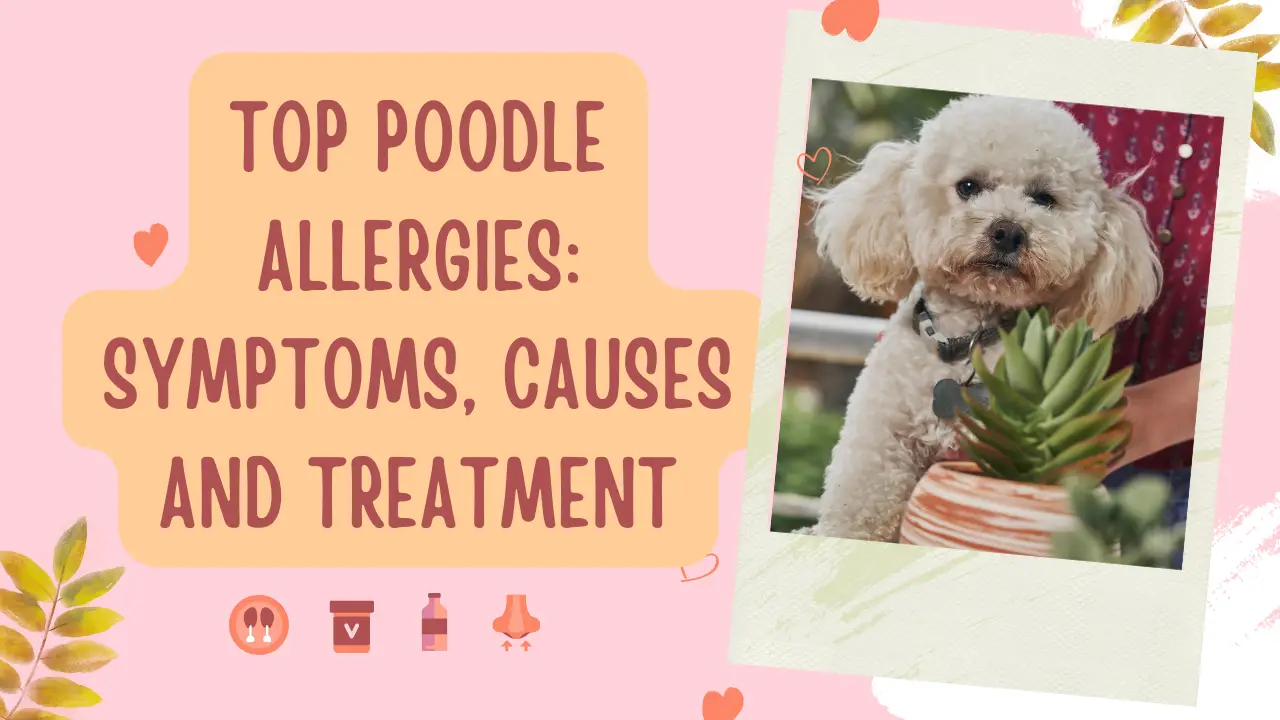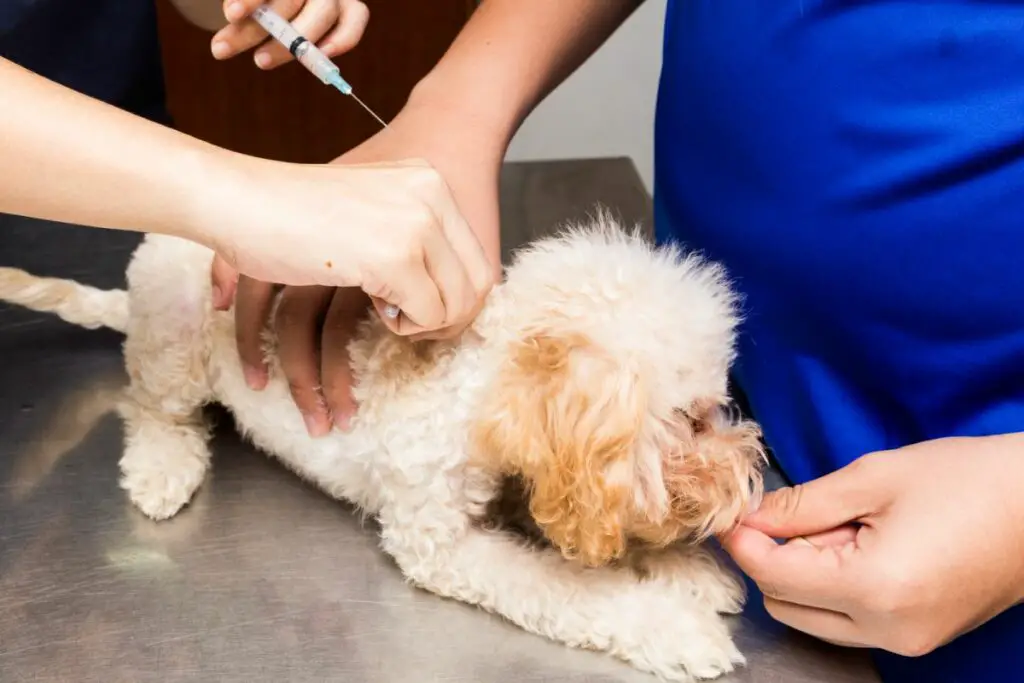This article will explore the causes and symptoms of Poodle allergies in order for pet owners to understand their Poodle’s needs and sensitivities better. Poodles are known for being a hypoallergenic dog breed, and it is important to recognize the relationship between allergies in Poodles and their owners. By understanding what allergens can trigger allergies, both dog owners and Poodle’s can lead happier, healthier lives together.

(This is an example only and is not meant to diagnose or treat any medical condition.)
| Type of Allergy | Symptoms |
| Food Allergy | Vomiting, diarrhea, itchy skin, ear infections, poor coat condition, chronic gas, and bloating |
| Inhalant Allergy | Sneezing, coughing, runny nose, itchy skin, red eyes, and wheezing |
| Contact Allergy | Redness, itching, and hives on the skin, paw biting, ear infections, and hair loss |
| Flea Allergy | Intense itching, skin irritation, hair loss, and inflamed skin |
| Bacterial Allergy | Skin infections, hot spots, and lesions |
| Yeast Allergy | Itchy, smelly skin, ear infections, and paw biting |
| Drug Allergy | Hives, facial swelling, and diarrhea |
Vet tip: When doing an elimination diet vets often use a hydrolyzed hypoallergenic diet (like Purina HA or Royal Canin Anallergenic) as regardless of what the dog reacts to, this food should be tolerated.

Read our Smart Poodles - Smart Tricks eBook for only $2.99
Dive into a treasure trove of engaging tricks and tips designed specifically for your poodle!
What Will You Learn? 👇
Are Poodles Hypoallergenic and What Does It Mean?
What does hypoallergenic mean for a dog breed?
Hypoallergenic dog breeds are those which produce fewer allergens than other breeds, typically making them more suitable for allergy sufferers. This does not mean that they are completely allergen-free, but they produce less dander and other irritants that may cause allergic reactions in sensitive individuals.
Why are Poodles considered a hypoallergenic dog breed?
Poodles are considered hypoallergenic because they produce less dander compared to other breeds. Dander is composed of skin cells and proteins found in the dog’s coat, saliva, and urine that can trigger allergies. Poodles have curly hair, which holds less dander and also sheds less than other breeds, reducing the allergen exposure to pet owners.
Can people with allergies still have a Poodle?

While Poodles are considered hypoallergenic, it is possible for people with allergies to have a reaction to a Poodle still. However, the severity of the reaction can vary between individuals. It is essential to spend time around a Poodle to see if an allergic reaction occurs before making a commitment to own one.
Identifying Common Poodle Allergies and Causes
Allergies in Poodles: What are the most common causes?
Allergies in Poodles are commonly caused by flea allergies, food allergies, and environmental allergens such as pollen, dust, and mold. Additional causes can include contact with irritating substances like household cleaners or grooming products, which may cause skin irritation or provoke an allergic response.
Understanding how flea allergies affect Poodles
Fleas are a common allergen to trigger allergies in Poodles. A Poodle with a flea allergy will experience an allergic reaction to the flea’s saliva, leading to skin irritation and itching. This can cause the Poodle to excessively scratch, bite, or lick the irritated skin, leading to hair loss, inflammation, and infection.
Environmental allergens: Pollen and Poodle allergies
Environmental allergens such as pollen, dust, and mold can cause allergies in Poodles, resulting in symptoms like itching, sneezing, and discomfort. These allergens can be found in the air and can trigger allergic reactions when inhaled or come into contact with the dog’s skin.
Dealing with Skin Allergies in Poodles
Causes of skin allergies in Poodles
Skin allergies in Poodles can be caused by flea bites, food allergies, or environmental allergens. Additionally, contact with irritants such as grooming products, household cleaners, or synthetic materials in bedding or toys can cause skin irritation and lead to an allergic reaction.

Allergy locations: Where do skin allergies affect Poodles?
Skin allergies in Poodles often affect areas such as the ears, face, paws, and belly. These areas of sensitive skin may become red, swollen, and itchy, leading to scratching, biting, and licking, which can further exacerbate the problem and lead to infection or hair loss.
Treatment options for skin allergies in Poodles
Several treatment options can alleviate skin allergies in Poodles. Depending on the cause, treatment options may include flea prevention, hypoallergenic dog food, antihistamines, medications to reduce inflammation, and topical treatments to soothe irritated skin. Regular grooming can also help control allergies by removing allergens from the Poodle’s coat.
Determining Allergic Reactions to Poodle Saliva and Dander

Poodle saliva: What causes allergens?
Poodle saliva contains proteins that can cause allergies in humans. The proteins found in saliva can adhere to the Poodle’s fur and dander, spreading allergens throughout the environment and potentially triggering an allergic reaction in sensitive individuals.
Poodle dander: Is it a significant allergen for people?
Poodle dander can be a significant allergen for people who are sensitive to it. However, Poodles produce less dander than other breeds, making them considered hypoallergenic. They may still cause an allergic reaction in some individuals, but the risk is generally lower due to their reduced dander production.
Handling Poodle Saliva and dander allergies in humans
To minimize allergies caused by Poodle saliva and dander, frequent grooming and bathing can help reduce the amount of allergens in the environment. Creating a designated area for your Poodle to sleep and play can also help minimize contact with allergens. For those with severe allergies, it may be necessary to consult a doctor about treatment options and consider other hypoallergenic pet options.
Allergy Treatment Options for Poodles and Their Owners
Allergy treatment methods for Poodle owners facing allergies
Pet owners should take steps to minimize allergen exposure by regularly grooming and bathing their Poodle, using hypoallergenic dog food, and controlling environmental allergens such as dust, pollen, and mold through air purifiers and cleaning. In some cases, allergy medications or immunotherapy may be helpful in managing symptoms.
Using antihistamines and fatty acids in Poodle allergy treatment
Antihistamines and omega-3 fatty acids, such as fish oil, can be helpful in reducing inflammation and allergy symptoms in Poodles. These supplements can be added to your Poodle’s diet or used topically on the skin to alleviate itching and discomfort caused by allergies.
How regular grooming affects Poodle allergies
Regular grooming helps manage Poodle allergies by removing loose hair, dander, and other allergens from the dog’s coat. Regular baths with hypoallergenic shampoo can also prevent skin irritation and keep the Poodle’s skin healthy. This can effectively reduce the amount of allergens in the environment and minimize allergic reactions in both the Poodle and its owner.
Marko is the founder and author at PoodleHQ, where he blends profound expertise with formal training in Animal Behavior and Canine Genetics. With multiple generations of poodles under his care, he’s a breed connoisseur, honored with the Canine Care Excellence Award and lauded by the International Pet Enthusiasts Association.

